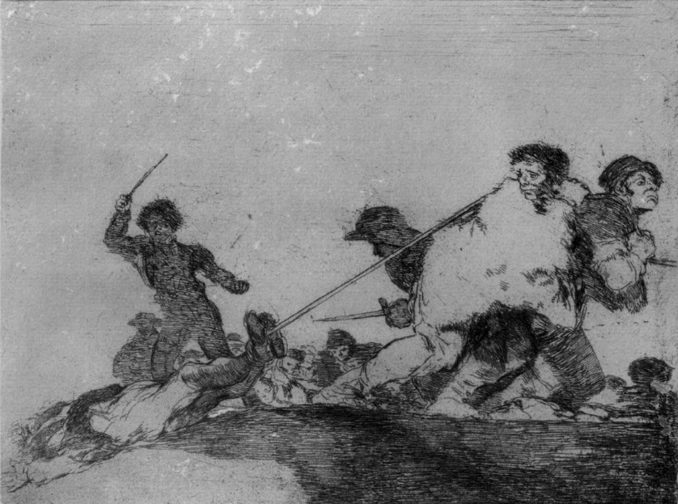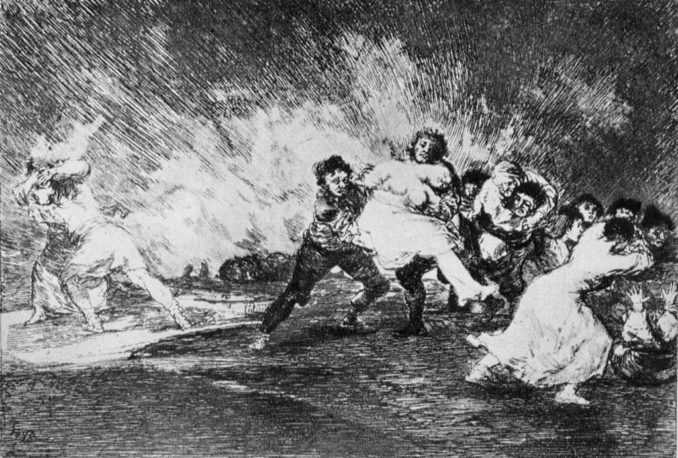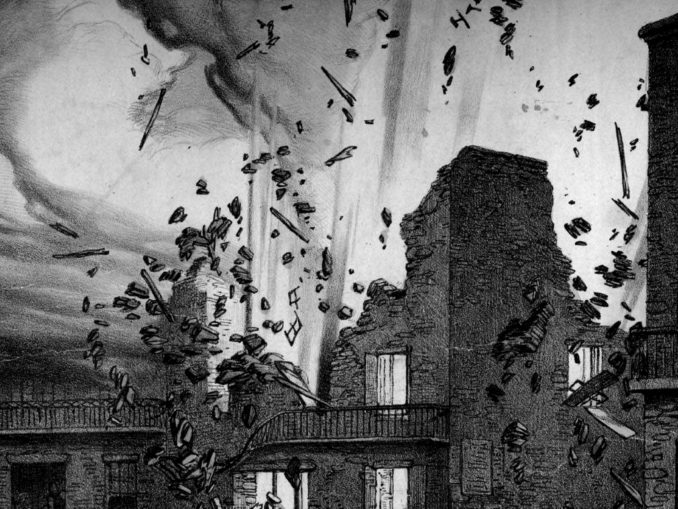January 19th, 1809.
Our return to Lisbon will not be like our march north. Then we were travelling with an army in good order on broad roads through a populated area near the coast. Now we are fugitives and must avoid the coastal area, which is swarming with French soldiers.
A party of bears is a conspicuous thing, and rumours will be rife of our exploits at Sahagún where we routed the French cavalry. So we must turn east and make our way through the foothills of the mountainous interior, keeping to minor roads or, where necessary, no roads at all.
Yet our little band is not unsuited to such a journey. Nine of us are bears, and at home in the mountains. Fred has been on the move all his life. Jem, originally a city dweller, is now hardened to the privations of rough travel in hostile territory. Looking at him now, bearded, filthy, and swathed in a stinking sheepskin coat he has looted from a French corpse, I can hardly believe that less than a year ago he was a respectably attired manservant serving port on a silver salver to a lord at a famous university.
Fred said to me, ‘Daisy, me ole gal, we got an ’ard march in front o’ us. I knows yer and the bears can do it, an’ so can we. But I got one thing wot I needs to say to yer. When we’re in a town or a village, we’re two men wiv a bunch o’ dancin’ bears. But when we’re in the ’ills, yer in charge ’cos that’s yer country and yer knows best what we oughter do.’
I laid my paw on his shoulder to signify that I understood. Dear Fred, he has no false pride about his lofty human status. We will get him and Jem safe to Lisbon. Our situation is precarious but our hearts are high. To think that last year I was reading Xenophon’s Anabasis, about a gallant company’s desperate march out of danger in a foreign land, and now we are reliving it!
January 21st, 1809.
We ran into trouble yesterday night, only a few miles outside Corunna: a French patrol, with a corporal and four privates. We were travelling with Fred and Jem at the front, and us bears following at a discreet distance. When Fred and Jem were halted they tried to dissemble, passing themselves off as local peasants, but the corporal was not unintelligent and saw through their pretence. The soldiers were reversing their muskets to give them a beating, but we had already advanced silently into the scrubby undergrowth on both sides of the road, and we descended on the Frenchmen and despatched them with a few blows. It had to be done; we can leave no trace of our passing.
We threw the bodies into a nearby ravine, where they may lie for ever. All over France, many thousands of mothers will never know what happened to their sons. But I have my own son with me, hale and hearty, and he shall be guarded as only a mother bear can.

We went through their pitiful haversacks. As far as military supplies went, there was a useful amount of powder and some bullets that will need to be melted down and recast in the proper size. We threw their miserable muskets away after smashing the locks. Other than that, there were a few loaves of bread, some onions, and four bottles of lamentable wine, all of which we shared out on the spot. The mighty emperor does not look after his troops well. The wine helped to assuage the memory of this sad encounter.
Jem insists on carrying all the powder himself. ‘That way,’ he says, ‘if I gets blown up, it’ll be just me and yer’ll be right.’ He has made panniers out of two soldiers’ haversacks and webbing that we can carry on our shoulders. We cannot begin to shoot game until we are into open country.
It is a bitterly cold winter and the men are suffering, though of course we bears are well protected by our dense fur. We sleep in a heap with the men in the middle, in a chorus of snores, and they are comfortable enough.
January 24th, 1809.
Yesterday at sunset we halted at a deserted farmhouse. It had been burnt and the roof was half gone, but one room was sheltered enough. As we were settling down for the night we heard voices, speaking Spanish. Jem called softly to them that we were friends, and we went out cautiously to meet them, with loaded and cocked rifles, to face a couple of ancient blunderbusses pointed in our general direction. A few minutes’ parley established that they were local farmers driven out by the French, and now formed into a wandering band seeking retaliation. So we had common cause, and weapons were lowered. They were astonished to find that most of our party were bears, but in war anything may be expected.
They numbered a dozen, cold and hungry, and we shared out today’s bag of rabbits and partridges, roasted over a fire for the men but we bears have better teeth and can dispense with cooking. They told us that Ferrol had fallen to the French, and a large quantity of British arms had been captured – not news that we wanted to hear. They themselves had nothing but their primitive guns, a few rusty swords and knives of various sorts, and a burning desire for revenge.
For their style of warfare they used a word I had not heard before, guerrilla, ‘a small war’. This is the ‘Fabian strategy’ as conducted by that great general Q. Fabius Maximus Verrucosus, known as Cunctator, ‘the delayer’, who harassed Hannibal’s invading army by refusing to confront it directly, instead conducting a series of skirmishes to wear the enemy down a little at a time.
January 26th, 1809.
The Spanish guerrilleros stand in need of weapons, and we resolved to get them some. Such an enterprise needs careful planning. We decided to ambush a small French party on a deserted road as far as possible from any villages, lest the French should discover the scene of the attack and murder the local people, as is their bloody custom.
In this sparsely populated countryside there was little difficulty in finding a suitable spot, and Fred and Jem set themselves in suitable firing positions overlooking the road. They planned to shoot the officers or sergeants, and as soon as they had both fired we bears and the Spaniards would come out of the scrub beside the road and despatch the remaining men. It was a day of freezing rain, to our advantage as we guessed that the French soldiers would be less than meticulous in keeping their priming dry in a place where, as they supposed, they controlled the country.
The land is awash with French troops, and soon enough a detachment of fifteen men came trudging along the muddy road, led by a sergeant with a corporal at his heels. Two shots sounded and they fell, then we poured out of the bushes and dealt with the others with claws and knives. Not a shot was fired against us, though I heard a few dismal clicks as flints failed to ignite wet powder. I do not like killing men in cold blood, but the blood of our Spanish allies was hot enough, and not a man was left alive. We dragged the bodies to a convenient escarpment and threw them over. They may never be found.

Our booty was more than enough to arm every man of the Spanish band, but I noted with sadness that many of the muskets were captured British ones of the Brown Bess type. Anyway, they are ours now: not a weapon to rival our Bakers, but good enough up to 80 yards. There was powder and ball aplenty, as well as the men’s rations. Well satisfied, we returned to the farmhouse and ate the food and drank the wine. We are now fast allies and ready for further action.
February 5th, 1809.
Last night a red glow in the sky alerted our band, and we hurried down the valley towards it. The French had destroyed yet another village, and the survivors were fleeing the conflagration.

To our relief it was not a consequence of our raid, whose evidence we had, as we thought, concealed well enough. It seems that a farmer had hidden some of his grain store from the invaders, and that was enough to provoke the French into barbaric reprisals.
Our band of guerrilleros has grown, and now numbers women and children, all bent on bloody revenge.
February 7th, 1809.
And revenge we have had: fire for fire. The villagers told us that the French were using an outlying house as a powder magazine and store for munitions. We needed more weapons for our increased forces, so we resolved to raid it. Our plan was simple. We would descend on the house at two o’clock in the morning, when sentries are least alert, dispose of them, take what we needed, and blow up the rest.
So it was. The effect of nine roaring charging bears and a mob of furious screaming humans cannot be underestimated. Only a few shots were fired before we had possession of the place and had dealt with the garrison. We took as much powder, bullets, muskets, pistols, swords and provisions as we could carry, and what Jem and Fred could load on to a small handcart we had found. There was a small field gun which provoked some discussion about whether we should have it, but it was deemed too cumbersome for our style of war and abandoned. We lit a long fuse to the remainder of the gunpowder and retreated to a safe distance.

A few minutes later the building went up with a thunderous and satisfying detonation. Looking around me in the glow, I could see savage joy on the faces of all present, and felt it in my own heart. I do not think that I am a civilised bear any more.
Angelina has taken a musket ball in the shoulder, but Jem was able to remove it. I brought thyme from the hillside to make a poultice, which as we bears know reduces the risk of infection. The wound is not grave and she can limp along while it heals, as bears do.
February 8th, 1809.
As Marcus Aurelius sagely wrote, ἡ βιωτικὴ τῇ παλαιστικῇ ὁμοιοτέρα ἤπερ τῇ ὀρχηστικῇ – life is more like wrestling than dancing. But there is a time and place for dancing, and for an evening we forgot our troubles. There was food and wine and rejoicing, and we all danced the fandango to the music of Jem’s flute and a small guitar played by one of our Spanish friends. Henry, our youngest bear, was overindulged and dozed off in a corner, and we had to carry him to our sleeping quarters in the bushes.
We must be on our way soon. It is three hundred miles to Lisbon as the crow flies, but we are not crows and must thread our way around the hills and valleys.
February 10th, 1809.
We have taken leave of our Spanish friends, now a resolute and well armed band intent on the destruction of the invaders, and are heading south again. It was a bittersweet farewell, with rejoicing and boasting of our exploits, but we all know that we would rather be conducting our peaceful everyday lives than skulking in a mountain fastness planning raids on a powerful and pitiless invader. Nevertheless we all accept the decrees of fate, and no one repines.
Even here on the edge of the mountains the French present a constant danger. We march with two bears sent ahead as scouts. Already twice today one of them has come galloping back with a warning, and we have had to change our route. It will not be an easy journey.
Copyright © Tachybaptus 2019
The Goodnight Vienna Audio file
Audio Player



